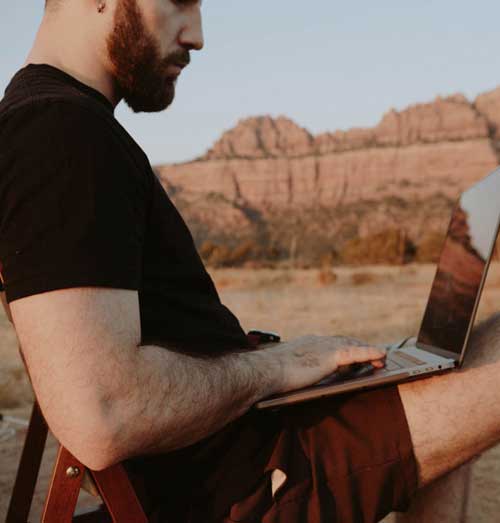Explore effective strategies for dealing with felon guests who overstay, and learn how to resolve challenging situations while protecting your property.
Today’s episode is a bit different and quite the rollercoaster. It’s one of those stories you hope never to have to tell, but here we are, sharing a real-life experience that could have easily turned into an STR host’s worst nightmare: our first squatter scare.
Now, I know what you’re thinking – “squatter” is a strong word, especially when referring to a guest who has overstayed their welcome. But when a routine check-out transforms into a lock-in situation with a guest refusing to leave, it feels nothing short of a squatting scenario.
Before we dive in, I want to reassure you, especially if you’re new to the short-term rental game or considering diving in, that this is not the norm. My team and I have managed tens of thousands of reservations, and this is the first time we’ve encountered such a stressful situation.
So, take this episode as a learning opportunity, one that arms you with the knowledge to prevent, manage, and navigate through the rare but possible challenges of being an STR host.
This experience was eye-opening for us in many ways.
But, it’s not just a story of stress and panic; it’s a tale of learning, adaptation, and reinforcement of our operational protocols. So, buckle up as we walk you through the entire ordeal, step by step, and share the vital lessons learned along the way.
In this episode, you’ll learn:
- Red Flag Recognition
- The complexities of managing bookings from OTAs like Booking.com
- The importance of having a comprehensive rental agreement
- Dealing with Overstayed Guests
- Preventive Strategies and Lessons Learned
Remember, the goal here isn’t to scare you but to educate and prepare you for the realities of being an STR host. By sharing our story, we hope to equip you with the knowledge and tools to protect your investment, maintain your peace of mind, and continue to provide exceptional experiences for your guests.
Need help managing your short-term rental and you don’t want to go it alone? Shoot us a message here and we’ll see if we can help.
Are you enjoying the podcast? Please subscribe, leave a rating and a review, and share it! This helps us reach others that may find the info helpful as well.
You can find all of our links here including our website, recommended resources, upcoming live event, short-term rental playbook, Instagram, and more!
Click Here to view TranscriptWelcome to Short Term Rental Riches.
We’ll discuss investing in real estate, but with a specific focus on short term rentals.
Quick, actionable items to acquire, manage, and scale your portfolio.
I’m your host, Tim Hubbard.
Welcome back to the Short Term Rental Riches podcast.
Today, we’re just gonna get right into it.
No beating around the bush.
We’re just gonna jump right in.
And after tens of thousands of reservations, we got our first squatter, or someone you could say that just overextended their stay, but in a very ugly way.
And so I don’t wanna intimidate you if you’re out there and you’re just getting started or you haven’t quite got your short terminal yet.
Remember, my team and I have managed tens of thousands of reservations, and this is the worst guest overstay experience we’ve ever had.
Can’t really call it a squatter because he was out pretty soon afterwards, but this could lead to someone squatting, and all the things we’re gonna talk about today are things that you should be doing to try to prevent these types of reservations, these types of guests from entering your property in the first place.
So I like to think that my team and I have done a really good job, and that’s why this is the first time that it really got a little stressful.
So let’s just go ahead and jump into it.
What happened here?
We had a guest check-in.
We did all of our normal guest check-in procedures.
So the first red flag for us was there a little bit of weirdness going on with the credit card.
Tried to book a property with his mom’s credit card, and the names didn’t match up, so of course we didn’t accept that.
And just to back up one step, this is from booking.com, and so if you’ve tuned in to the channel for a while, you know that we list all of our properties on booking.com and we make a lot of money with booking.com.
There’s a lot of upsides to booking.com, but it can be one of the more trickier OTAs, or online travel agencies, to manage if you don’t have some of these steps in place.
One of the big things is that if you’re not using Booking by Payments, or booking.com payments where they’re doing it for you, which I wouldn’t recommend because they don’t allow you to take in a deposit, or the deposit maxes out at a very low amount.
The only other alternative to that is collecting the payment on your end, which is what we do.
We use Stripe, and that’s what most people in the industry are using.
And so we have a little more verification we need to do with that.
So the first red flag for us was that this credit card did not match up for the guest.
The second red flag for us was that we usually don’t like to accept locals unless there’s some really good reason or the communication’s been really good with our guests.
And while this guest was a local, he said that he has been out of state for a long time and he was just coming back.
So there’s a little bit of trickiness going on there.
And remember, we can’t actually just decline people based on where they come from.
That goes against the discrimination policies with Airbnb.
So we do have it in our house rules.
It says if you’re a local, you must contact us first.
Doesn’t mean we can enforce that rule, but it definitely helps us get a lot of response from our guests.
And we always ask our guests why they’re coming to town first too.
That’s a good way to provide them a better experience, but it’s also a good way to find out a little more information and potentially weed out some bad guests.
You should definitely be doing that if you’re not already.
Okay, so there was a little bit of weirdness going on with this credit card, but we got that sorted out.
We got his payment upfront before giving them the check-in code.
That’s always a good idea.
And we got their deposit, or we had an authorized hold on their credit card for a deposit in case something got damaged in the property.
We have time to check them after their checkout.
We got a rental agreement signed with a signature, highly, highly suggested.
And no, I’m not referring to just the house rules that you might have in Airbnb, but we sent out an actual rental agreement.
It’s a contract to rent the property.
They sign it digitally.
It has the dates of the reservation.
It’s one thing that you definitely want to have in a situation like this, so you can provide it to the police if you need to.
So we got a rental agreement signed.
We got a credit card payment.
We got a deposit hold.
We got a selfie from the guests.
So this is another thing that our team does to match up the photo with the ID.
So we also get their ID.
We got all of these things.
So I think we were doing a pretty good job.
We got information from the guests, at least from what they said.
They’re moving back into town.
And so even though there was a few red flags going on there, we were able to sort them out, and we let the guests check in.
So we thought everything was fine and dandy until the day the checkout came, and our housekeeper showed up.
And luckily, no one got hurt or anything like that in this situation.
But the guest basically slammed the door right in front of our housekeeper, locked the door.
She thought she saw a weapon, a gun inside.
And so we contacted the police, and this is when things got a little dramatic, like seen from a crime movie or something.
And I’m not just saying that.
I mean, the police actually showed up.
The news showed up, because what we found out is that this guest actually had multiple felonies after providing the ID to the police officers and our rental agreement, trying to get their help to get this guest out because they would not check out.
And there was, of course, we sent the general messages through the OTA or through email or however you’re responding.
Always a good idea.
And of course, we involved the OTAs, but there was nothing they could do at this point.
The checkout date came, door slammed in the face for a housekeeper, guest is not leaving, we call the police, he is a wanted felony, not just with one felony, but like multiple felonies on his record.
Our housekeeper thought they saw a gun in the apartment.
And so what did the police do?
Sadly, they didn’t do much of anything.
They would not go in there.
And so they basically left it up to us.
So of course, we started to panic just a little bit.
We do have some learning lessons from this, I promise.
So I’m gonna share those with you here in just a quick minute.
But just to continue, we didn’t stop there, right?
The police basically told us we’re not comfortable entering the property because there’s a weapon there that the actual local police would have that they had called the chief of police or something.
And that person told them not to.
So just remember, we need to know the rules in our local jurisdiction.
I’m gonna get to what our lawyer advised us in just a second, but we need to know our local rules.
But just because there’s a local rule, it doesn’t mean that the ordinances, the police, are always going to follow them to a T, right?
In this case, this happened to be in Tennessee, in a state that’s pretty landlord-friendly, where we would have thought that the police could have got them out a little bit easier, but they’re basically told by the higher-ups just not to do it.
And so we’re thinking things over, we’re trying to figure out how can we possibly get this guest out of our property, and multiple things were going through our minds, right?
Can we turn off the utilities?
Can we tell them we’re towing their car and actually tow their car?
Can we lock the door when the guest leaves?
Yes, we could have locked the door because all of our locks are virtual, right?
We can do that when they leave.
But we didn’t know that there was actually more guests in the property than there should have been.
So this is one other spot where we dropped the ball.
The camera for this specific unit was not working.
It is now, you better believe we fixed it right away.
But just another reason to make sure that those cameras are always working, or you never know, unless you’re there personally, how many people are actually entering your property.
So even if we had locked the doors with the guests on the outside, which surely the police would have gotten them after that, there was guests in there just to easily unlock the door.
So that wasn’t really a good scenario.
So what did we do?
We called my lawyer, a real estate lawyer, mind you.
So different lawyers for different things.
You want to make sure you’re talking to a professional that knows your industry.
And he recommended, unfortunately, not to turn the utilities off as much as we wanted to, you know, after finding out all the details, and to not do any of those things, but to go to our local court and file what’s called a forced eviction.
And so this would have given him seven days to make it to court.
And had he made it to court to accept the court date in the future, he could have actually stayed in our property for another 30 days legally.
So again, this is just the local jurisdiction where we are at.
If you haven’t checked your local jurisdiction yet, highly, highly recommend it.
Hopefully, you never have to get to this point, but it’s good to know beforehand so that you and your team or your property managers, whoever’s helping you with the property, can stay a little more calm during these sort of stressful situations.
So I’m gonna recap and give you our takeaways here in just a second.
We covered a lot of topics on this podcast in a quick, actionable, bite-sized format so you have the tools to acquire and improve your short terminals on your own.
But if you want to go deeper, I have a special invite for you.
Join us once a month at our Rested Investor Clubhouse where we go in depth on an individual topic.
Everything from analyzing properties to improving operations and our bottom line, we cover it all.
The Clubhouse members and myself are sharing best practices to earn the most revenue with the least amount of headache, and I would love to have you there as well.
That’s restmethods.com forward slash rich.
Our lives are shaped by those we spend the most time with.
So if you want to take your STR to the next level, come join us.
I hope to see you on the inside.
But just to sort of break this down again, the guest is still on our property.
It’s the day after they’re supposed to have checked out.
It happened to be Valentine’s Day in this property in a downtown nice area above a restaurant.
With the news coming out and the police being there, they actually had to close the restaurant.
So seriously, it turned into a big ordeal.
And I feel bad for the restaurant owner.
He probably lost quite a bit of money on Valentine’s Day.
Luckily, we’re on really good terms with them, and they understood.
We’ve never had a situation like this before, as I explained in the beginning.
So luckily for us, during the night, this guest took off.
They left the property, and as I mentioned, we did not have a camera there, so that is totally our fault.
But we didn’t know it was a good surprise in the morning.
So in the end, we really lucked out here.
So what can we do to prevent these situations?
Let’s recap here a little bit.
Well, the first thing is, you gotta have some policies set up for vetting your guests.
Checking their prior reviews is always a good one.
Remember, on Airbnb and VRBO, it’s a little easier.
Sometimes on booking.com, people don’t have reviews, right?
Or maybe they haven’t used it as much.
And so check the reviews on whatever platform they’re on.
If there’s some red flag ones, well, you can cut it there.
Make sure you have the rental agreement.
Make sure you get an ID.
Make sure you get payment for the reservation before someone actually checks in.
Make sure you’re getting a deposit, or a deposit waiver is another good way to go.
And remember, if the credit card does not match the guest’s name, then they can do what’s called a charge back.
What is a charge back?
Basically means at the end of a payment or whatever time it happens to be, a credit card customer calls a credit card company and says, this was a fraudulent charge, or I didn’t approve this charge, or whatever it happens to be.
And most of the time, sadly, that credit card company is going to refund the customer of the credit card company and not the merchant, us in this case.
And what do you think happened with this reservation afterwards?
So not only do we wanna avoid these bad guests in the first place, but they’re always, they’re the ones that leave the really bad reviews or have these fraudulent charges in the back end.
So it’s even more important to make sure we’re doing our guest verification up front and never getting these people in in the first place.
So we want that credit card.
We wanna make sure it matches the ID.
We want a selfie.
This allowed us to go to the police, show them the ID and say, hey, look, this is in fact that person.
They were able to match that up.
And of course, find that they had felonies and all that.
So you do wanna selfie, and that’s gonna help you win those charge backs if someone ever disputes a credit card charge that is not fraudulent.
So in the end, what we decided to do here is that we had multiple red flags popping up here.
And we just decided if we ever have more than one red flag on a reservation, we’re going to decline it.
So here we had an obvious couple, right?
We had the credit card that didn’t really match up.
We had the local coming back.
And so we would deny this again in the future.
So that’s what we’re doing.
Some other things you might want to keep an eye out for are those last minute bookings.
Remember, if we have less time to vet a guest, to get our real agreement, to do all these things, that leaves a little more exposure for us.
We don’t want the mismatched credit cards.
And another example came up is that we had another guest checking in the future that had a company credit card.
Now, not all company cards match up 100% with those names.
I know that I have some that just have my company name on it versus my name.
So that’s up to you.
We decided we’re not going to accept any reservation unless the guest, from the ID they give us, matches the credit card.
We dropped the ball with the camera, so we would have seen multiple people coming in to that property had our camera been up and working that day.
And that would have been an earlier red flag.
Maybe we could have got this whole process started instead of figuring it out when the guest was supposed to check out.
Again, I don’t want to freak you out that this is something you’d be overly concerned about.
The reality is we just need to do a good job in the beginning of vetting our guests, doing these things, and that’s going to help us weed the good out from the bad.
And it’s also going to help us not get bad reviews.
Yes, guests left a one-star review, which we will have removed because there was some obvious craziness going on there, but they disputed the charge facts.
I mean, so we never want these guests in the first place because there are a lot of times the ones that are leaving us bad reviews and doing all that on the back end.
Yes, a bit of drama on Valentine’s Day, but it all worked out really much better than expected because remember, this guest could have legally stayed in our property another seven days to get a chance to go to the court, and then another 30 had they actually made it to court.
So make sure you check your local jurisdictions on this.
Talk with a real estate lawyer, a local real estate lawyer if you haven’t yet, just to be a little bit more prepared.
But at the end of the day, remember, this is a very, very small chance if you’re doing everything right.
If you want a little more help with your house rules or you want to find out a little more in depth about some of these red flags that I talked about today, you can head over to our website, strriches.com.
You can see all of our recommended resources there.
You can, there’s tons of downloads, our house rules.
You can search for the episode we did specifically on red flags.
Lots and lots of information out there after over 225 episodes.
I can’t believe we’ve been doing this every week for 225 weeks.
It’s been a fun journey, and I hope things have been going well in your world.
Until next time, have a wonderful week.
If you’ve been listening to the podcast for a while, then you know that I’ve been managing my properties virtually for years and years.
My team and I have managed thousands of guests.
We’ve learned a ton, and I’m really happy with the progress and the growth we’ve made.
In fact, we’re now big enough to help manage your properties as well.
Our team has a ton of experience from the inner city apartment to the large lakeside retreat.
We’ve worked with all types of properties across the nation.
We’ll help to take the management workload off your plate while earning top revenue and excellent guest reviews, all while charging an industry low fee.
If you’d like to find out if your property fits with our program, just head to strriches.com.
There you’ll see a property management button.
Again, that’s strriches.com.
Just click on the property management button, and we look forward to chatting with you soon.















